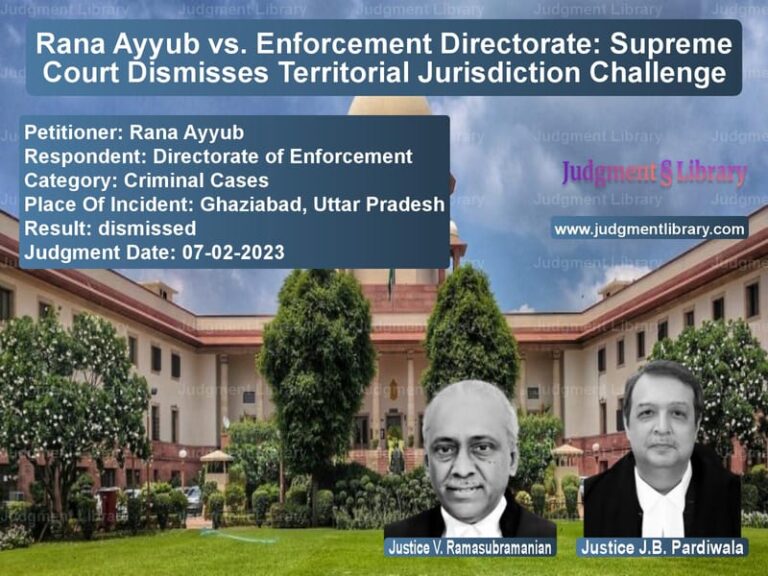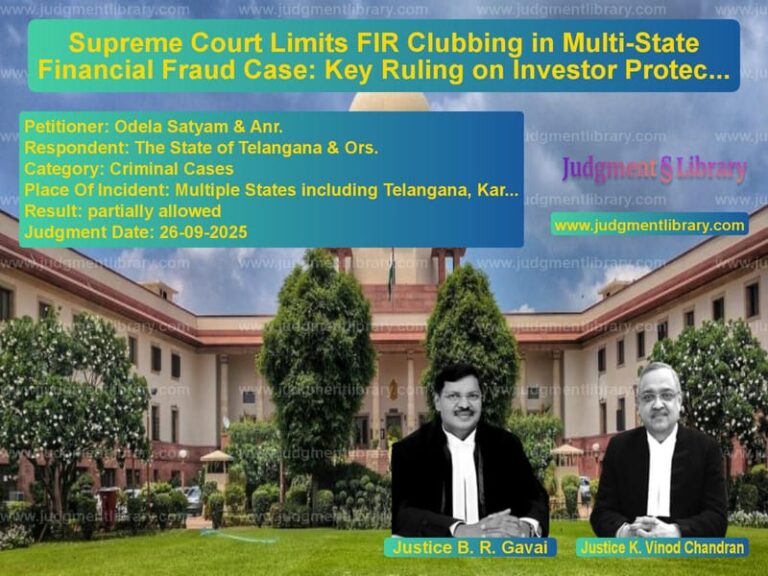Supreme Court Rejects Late Property Claim: Limitation Period for Challenging Sale Deeds Explained
The Supreme Court of India recently ruled in the case of V. Ravikumar v. S. Kumar, clarifying the limitation period for challenging property transactions executed under a power of attorney. The Court reaffirmed that once a valid power of attorney is executed and acted upon, its subsequent cancellation does not create a fresh cause of action for challenging past transactions.
Background of the Case
The dispute revolved around the validity of multiple sale deeds executed based on a power of attorney granted by the plaintiff to the defendant. The key timeline of events was as follows:
- October 15, 2004: The plaintiff executed a general power of attorney in favor of the defendant.
- 2004-2009: The defendant, using the power of attorney, executed several sale deeds transferring ownership of the suit properties.
- January 10, 2015: The plaintiff became aware of these transactions when he obtained a patta (title document) indicating property transfers.
- September 22, 2015: The plaintiff formally canceled the power of attorney.
- September 20, 2018: The plaintiff filed a civil suit seeking declaration that the sale deeds were null and void.
The defendant challenged the suit, arguing that it was barred by limitation since the transactions had taken place more than a decade earlier.
Trial Court’s Decision
The defendant filed an application under Order VII Rule 11 of the Civil Procedure Code (CPC), seeking rejection of the plaint on the ground that the suit was time-barred. The Trial Court found that:
- The plaintiff had knowledge of the property transfers at least by January 10, 2015.
- The suit, filed in September 2018, was beyond the three-year limitation period under the Limitation Act, 1963.
- The cancellation of the power of attorney in September 2015 did not reset the limitation clock for challenging past transactions.
Accordingly, the plaint was rejected as time-barred.
High Court’s Reversal
The plaintiff appealed, and the High Court overturned the Trial Court’s ruling. The High Court held that:
- The limitation period should be counted from the date of cancellation of the power of attorney (September 22, 2015), not from the date of property transfers.
- The suit filed within three years of cancellation was therefore within the limitation period.
- The case should be heard on merits rather than being dismissed at the preliminary stage.
Supreme Court’s Analysis
1. Limitation Period for Challenging Sale Deeds
The Supreme Court categorically held that the limitation period for seeking cancellation of a sale deed does not commence from the date of cancellation of the power of attorney. Instead, it starts from the date the plaintiff gains knowledge of the transaction.
“The attempt of the plaintiff is to unsettle settled matters, especially on the plea that the power of attorney granted in 2004 was canceled in 2015. We are clear in our minds that the cancellation does not affect the prior conveyances made which are clearly on the strength of the power conferred on the appellant.”
2. Validity of Transactions Executed Under Power of Attorney
The Court emphasized that once a power of attorney is validly executed, transactions made under it are legally binding unless the power was obtained fraudulently or under coercion. The plaintiff did not allege any fraud in executing the power of attorney.
“There is no contention raised as to the power of attorney having not conferred the power to enter into conveyances or that such power of attorney was executed by reason of a fraud or coercion employed on the executant.”
3. Impact of Cancellation of Power of Attorney
The Court clarified that cancellation of a power of attorney only affects future transactions and does not undo past transactions executed legally under its authority.
“The cancellation of the power of attorney will have no effect on the conveyances carried out under the valid power conferred. Nor would it confer the person who executed the power of attorney any cause of action, by virtue of a cancellation, to challenge the valid exercise of the power when it existed.”
Final Judgment
The Supreme Court set aside the High Court’s ruling and reinstated the Trial Court’s decision, dismissing the plaintiff’s suit as time-barred. The Court held:
“We are definitely of the opinion that the High Court had erroneously treated the cancellation as the point of commencement of limitation. The appeal stands allowed.”
Implications of the Judgment
- Clear Limitation Rules: This ruling affirms that the limitation period for challenging property transfers begins when the plaintiff first learns of the transaction, not when they decide to take action.
- Finality of Property Transactions: Once a valid power of attorney is executed and acted upon, past transactions cannot be undone merely by canceling the power later.
- Stronger Protections for Buyers: Purchasers of properties executed under a power of attorney can take confidence that such transactions will not be easily reversed.
Conclusion
The Supreme Court’s judgment in this case reinforces the principle that legal transactions executed under a power of attorney cannot be invalidated years later based on its subsequent cancellation. This ruling provides clarity on the limitation period in property disputes and ensures that legally executed transactions remain secure against belated challenges.
Petitioner Name: V. Ravikumar.Respondent Name: S. Kumar.Judgment By: Justice Sudhanshu Dhulia, Justice K. Vinod Chandran.Place Of Incident: Tamil Nadu.Judgment Date: 03-03-2025.
Don’t miss out on the full details! Download the complete judgment in PDF format below and gain valuable insights instantly!
Download Judgment: v.-ravikumar-vs-s.-kumar-supreme-court-of-india-judgment-dated-03-03-2025.pdf
Directly Download Judgment: Directly download this Judgment
See all petitions in Property Disputes
See all petitions in Contract Disputes
See all petitions in Landlord-Tenant Disputes
See all petitions in Judgment by Sudhanshu Dhulia
See all petitions in Judgment by K. Vinod Chandran
See all petitions in allowed
See all petitions in Quashed
See all petitions in supreme court of India judgments March 2025
See all petitions in 2025 judgments
See all posts in Civil Cases Category
See all allowed petitions in Civil Cases Category
See all Dismissed petitions in Civil Cases Category
See all partially allowed petitions in Civil Cases Category







